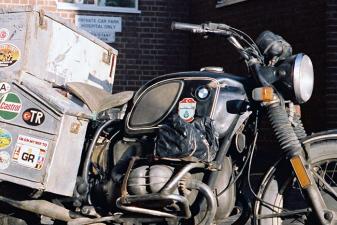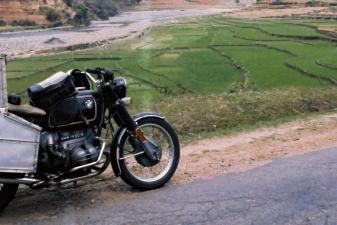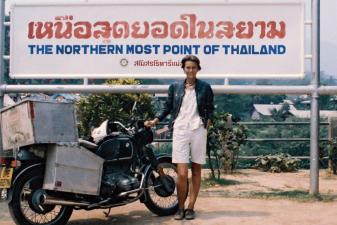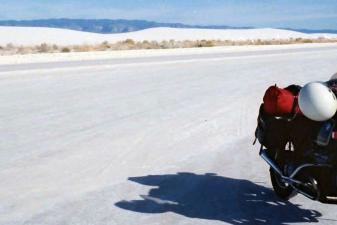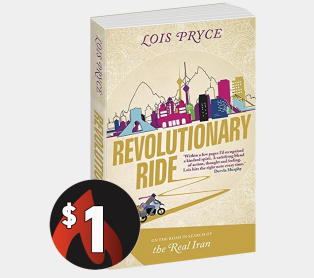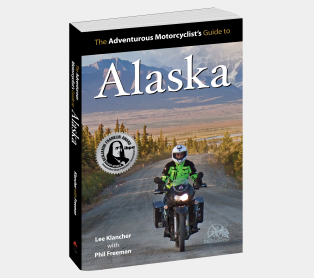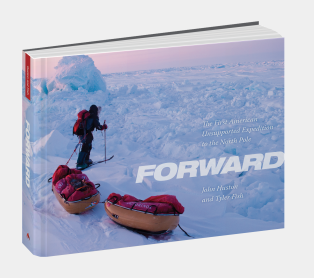Road to Revolution: Pakistan to Iran
An Excerpt from Lone Rider

In this excerpt from Lone Rider, Elspeth Beard makes midnight progress along the borders of Afghanistan. With the daggers of nearby onlookers glistening in the moonlight and a keen desire to go unnoticed, Elspeth does what she does best: she rides on. Read more in this excerpt from “Part 4: Kathmandu to Home” and continue following Elspeth’s progress around the world with “Part 5: The Aftermath."
The traditional route west from Multan led via Islamabad into Afghanistan, where it passed through Kabul and Herat, then left the country and skimmed through a short stretch of northern Iran on its way to Turkey.
However, with Afghanistan now out of bounds, the traffic followed a more southerly route via Quetta that was often no more than a series of tracks across a desert. Sometimes the tracks disappeared altogether, leaving us to orientate ourselves only by the dust plumes of trucks in the distance, which worked well until rain turned dust to mud, which it did shortly after we left Multan, the road and weather slowing our progress even more.
Riding towards Quetta, I sensed the approaching border with Afghanistan. Every time we crossed a mountain pass, the faces of the people changed as we encountered more and more Afghani refugees. Hanging around in the desert with rifles slung over their shoulders, most of the refugees, like the locals, were members of rival tribes, either Pashtun or Baloch. As outsiders, we were regarded with great suspicion. It felt threatening and unsafe, so we pushed on as best we could towards Loralai.
By five o’clock the sun was nearing the horizon but we still had more than 100 miles to ride to the nearest town. I still hadn’t been able to fix my headlight so we rode as fast as we dared while daylight remained. When darkness fell, we rode side by side so that I could see the road ahead by the beam of Robert’s headlight. The road, where it existed, was in a terrible state and I dropped my bike doing an emergency stop ahead of a deep trench across the road that I only saw at the very last moment.
After having crossed two fairly small rivers in the half-light of dusk, we followed the dirt road into a wide riverbed in darkness. At the center of the bed, we came to a stop at the shore of a fast-flowing river. Knee deep and strewn with huge boulders, it was about twenty-five meters wide. The beam of Robert’s headlight picked out a collection of trucks and fifteen to twenty truckers hanging around, waiting for the river to subside before attempting a crossing. Already, a few trucks were stuck halfway across the water.
‘We could camp,’ said Robert, ‘and cross it in the morning, but . . .’
I knew exactly what he was thinking. Even in the beam of Robert’s light, I had spotted too many daggers and guns on the truckers’ belts for either of us to be able to sleep there that night. The atmosphere was very edgy. Pitching a tent didn’t appeal.
‘No,’ I said. ‘Let’s keep going. I don’t think this is a good place to camp.’
We hung around for a while and watched a Jeep attempt the crossing. It got across, so we decided to have a go.
While Robert rode my bike through the water, I stood on the shore, watching until water got into the points at the front of the engine and it cut out halfway. Wading into the water, I helped Robert and some of the truckers push it to the far bank. Then Robert rode his bike through the water, almost making it all the way before his engine cut out.
Safely across the river, we removed the front engine covers on each bike and dried off the points by the light of a torch while a large group of truckers looked on.
‘Why don’t you take off your helmet?’ said Robert.
‘I can’t,’ I whispered. ‘They all think I’m a bloke and I think it’s best left that way.’
The truckers were friendly and helpful, standing back and not engaging, watching us rather than imposing themselves. A few of them smiled or gave us curious looks, which reassured me that they didn’t regard us as threats. But I didn’t want to find out if their attitudes changed when they realized I was a woman. They all carried rifles openly and I had no doubt that most of them also had several other weapons tucked under their belts. Not knowing if they were innocent truckers, refugees, bandits or mujahideen, I thought it safest not to take any chances.
‘We’ve got to get out of here quickly,’ I whispered to Robert, ‘before they realize I’m a woman.’ We focused on drying our points and half an hour later we were on the move again, only to be confronted by yet another river, this time with a bed of sloppy mud instead of rocks. After crossing the river and dropping one bike in the process, we still had another twenty-five miles to the nearest town. At the speed we were travelling in the dark, it would take us at least two hours if we encountered another river.
‘Follow me,’ said Robert. ‘And don’t use your brakes. We don’t want anyone seeing our taillights.’
Robert switched off his headlight and turned off the dirt road into the desert. Keeping as close as I could to Robert, I rode by feel, hoping there were no ditches or holes in front of me. Gradually my eyes acclimatized to the dark and we pulled up beside a sand dune, pitched our tent behind it and crawled inside for a much-needed sleep. When the sun rose the next morning, I discovered we were in the middle of a pancake-flat landscape in which our sand dune was the only bump. There were no other features – no hills, no rocky outcrops, no grasses or bushes. It was totally flat.
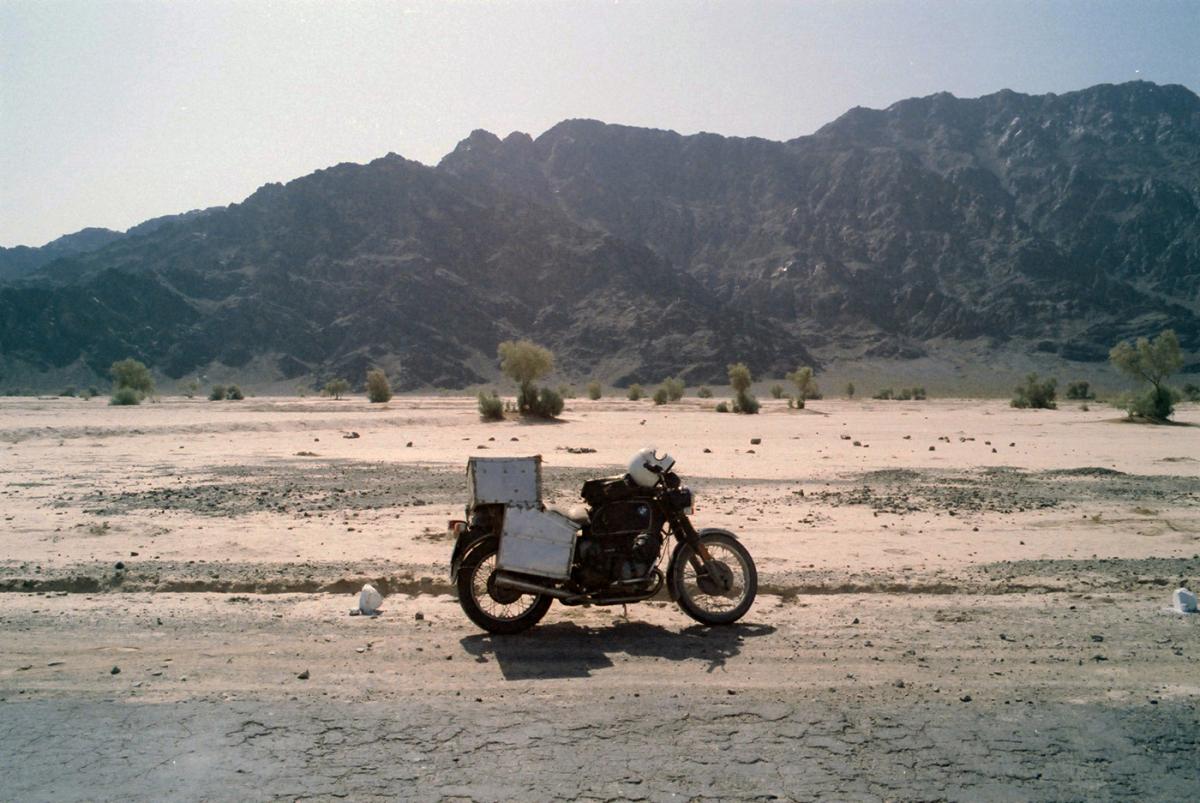
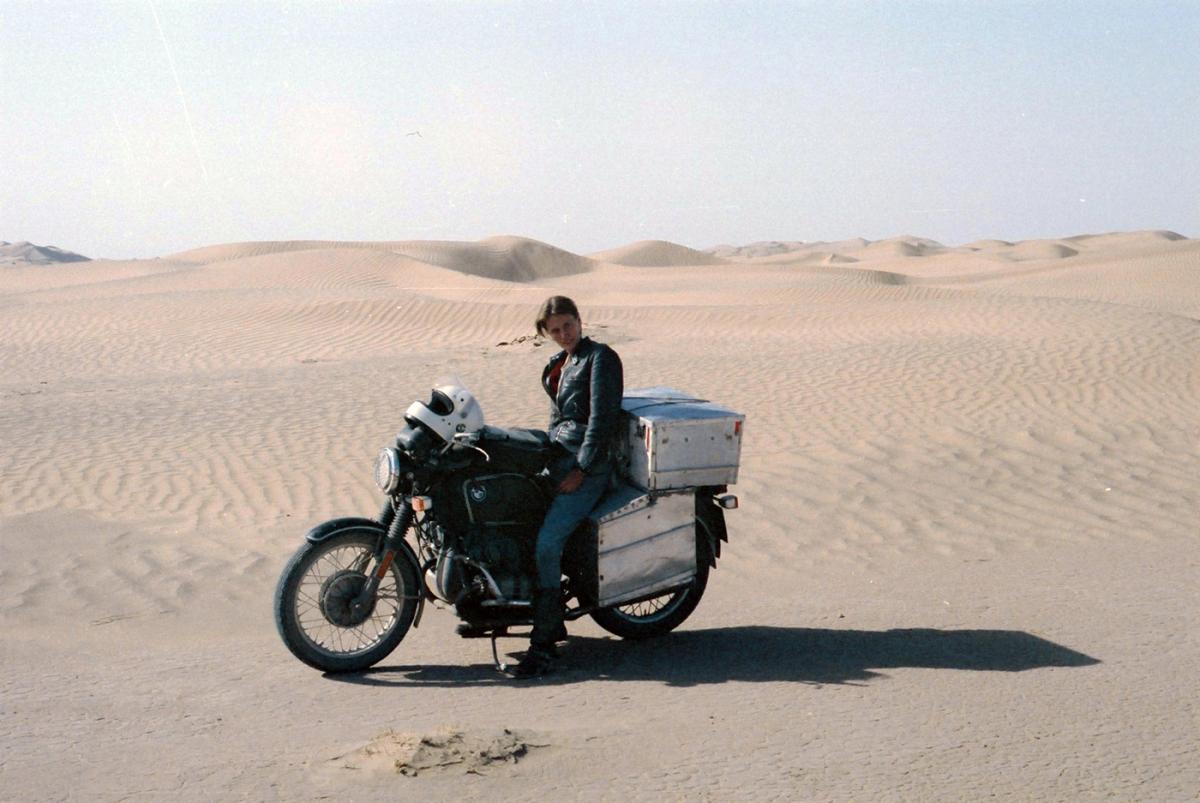
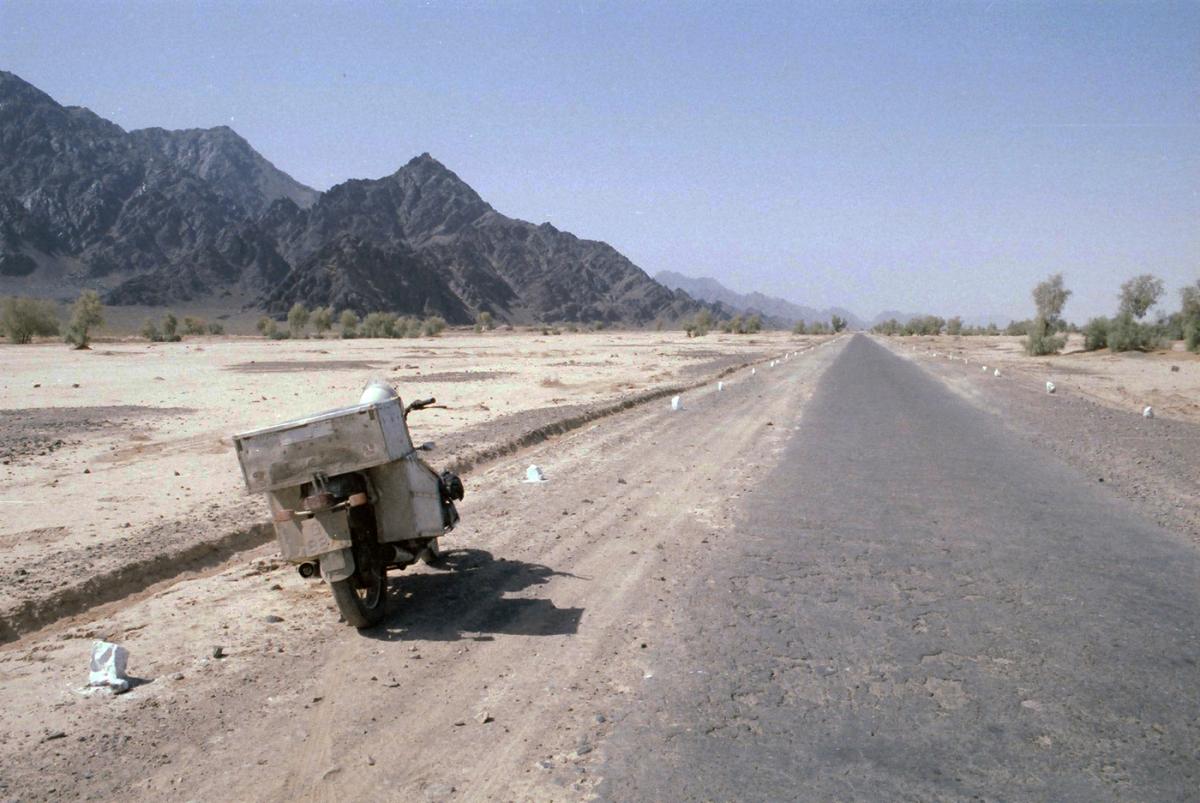
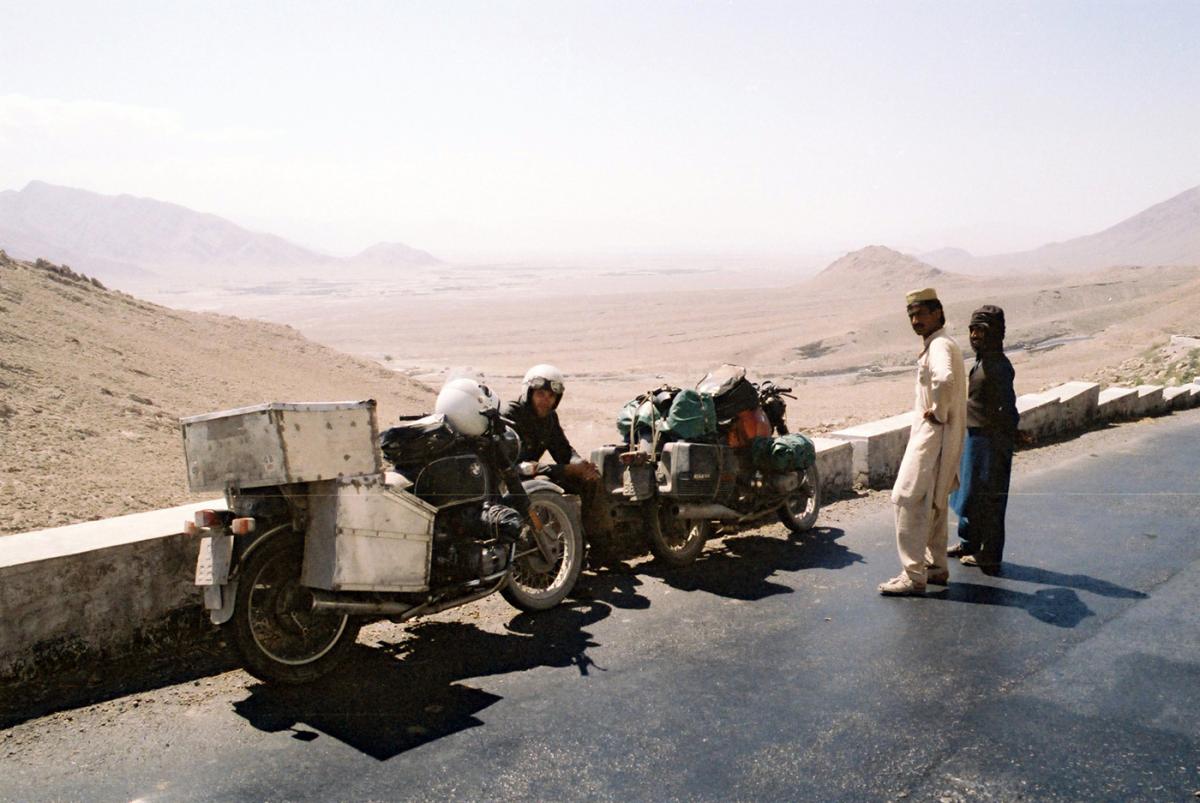
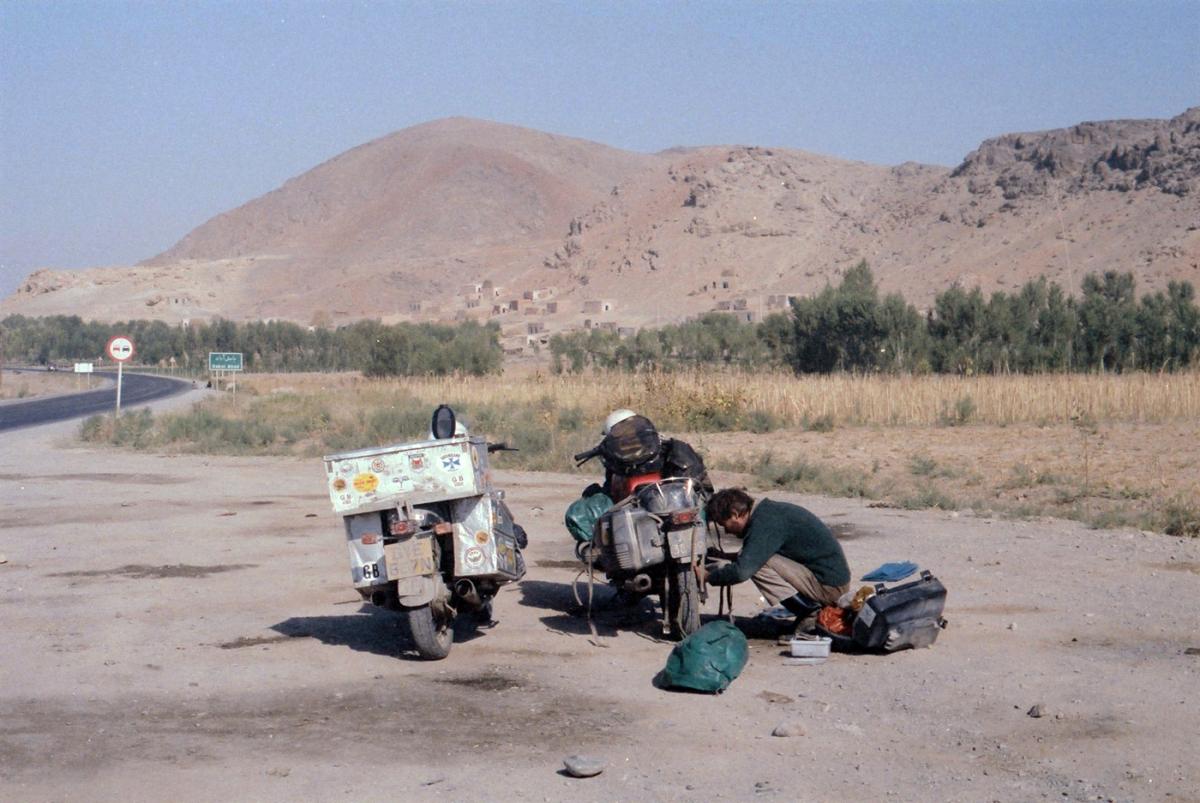
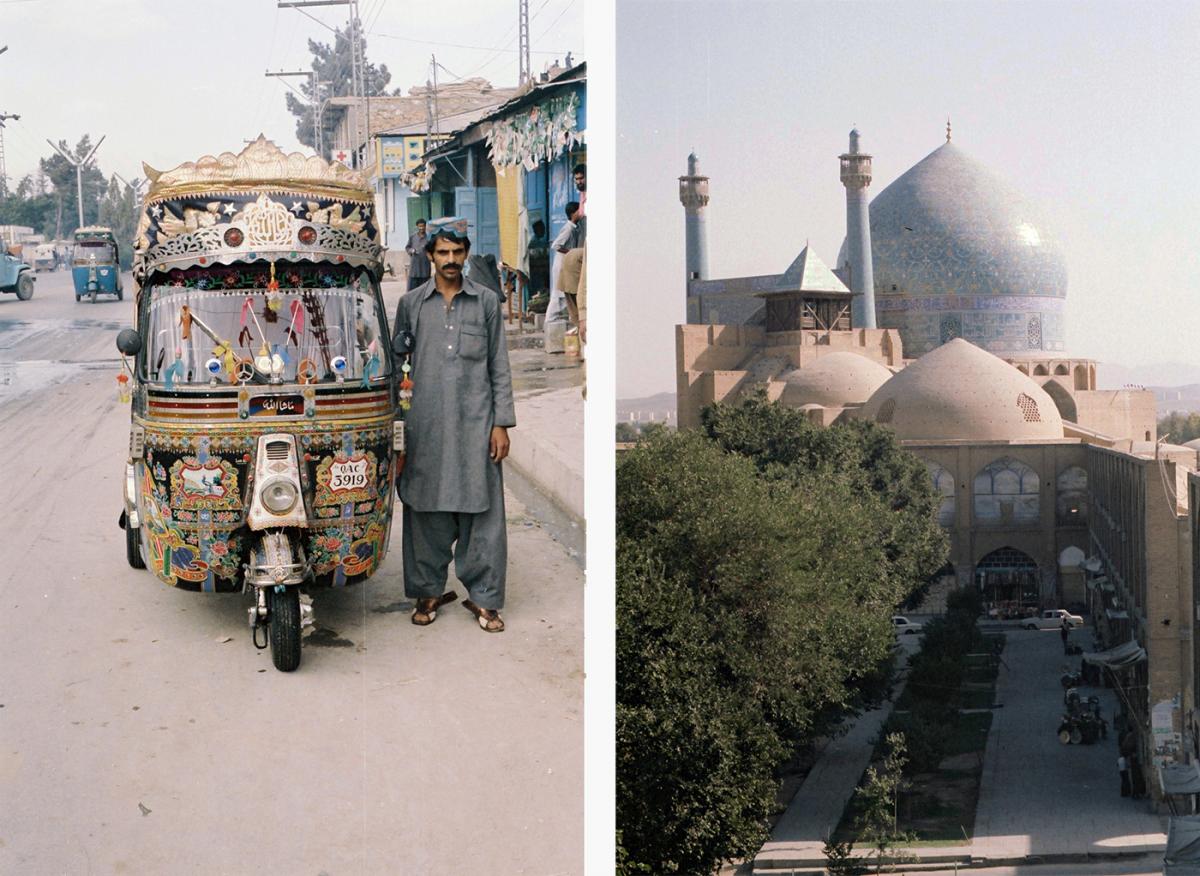
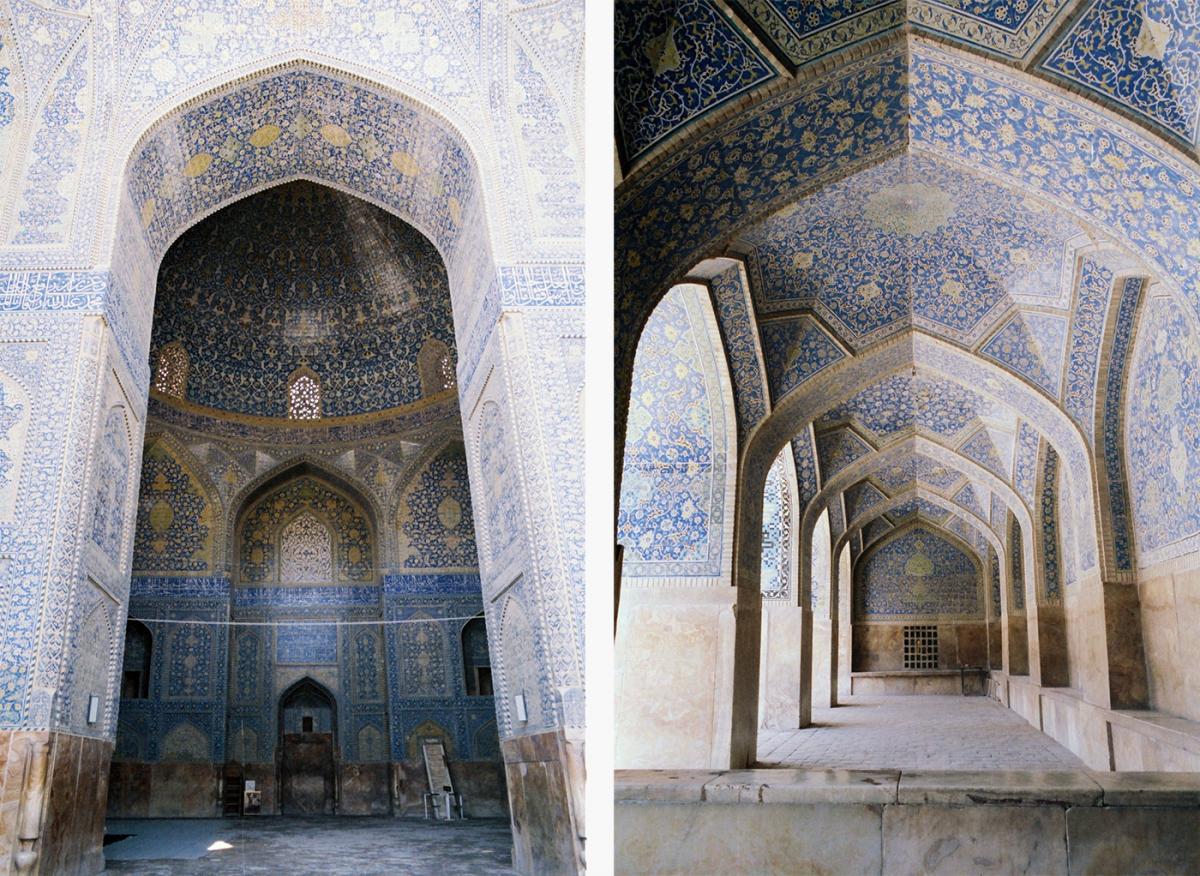
Read an excerpt from the final leg of Elspeth Beard's journey: "Part 5: The Aftermath."
And find Lone Rider on our website, HERE.
The traditional route west from Multan led via Islamabad into Afghanistan, where it passed through Kabul and Herat, then left the country and skimmed through a short stretch of northern Iran on its way to Turkey.
However, with Afghanistan now out of bounds, the traffic followed a more southerly route via Quetta that was often no more than a series of tracks across a desert. Sometimes the tracks disappeared altogether, leaving us to orientate ourselves only by the dust plumes of trucks in the distance, which worked well until rain turned dust to mud, which it did shortly after we left Multan, the road and weather slowing our progress even more.
Riding towards Quetta, I sensed the approaching border with Afghanistan. Every time we crossed a mountain pass, the faces of the people changed as we encountered more and more Afghani refugees. Hanging around in the desert with rifles slung over their shoulders, most of the refugees, like the locals, were members of rival tribes, either Pashtun or Baloch. As outsiders, we were regarded with great suspicion. It felt threatening and unsafe, so we pushed on as best we could towards Loralai.
By five o’clock the sun was nearing the horizon but we still had more than 100 miles to ride to the nearest town. I still hadn’t been able to fix my headlight so we rode as fast as we dared while daylight remained. When darkness fell, we rode side by side so that I could see the road ahead by the beam of Robert’s headlight. The road, where it existed, was in a terrible state and I dropped my bike doing an emergency stop ahead of a deep trench across the road that I only saw at the very last moment.
After having crossed two fairly small rivers in the half-light of dusk, we followed the dirt road into a wide riverbed in darkness. At the center of the bed, we came to a stop at the shore of a fast-flowing river. Knee deep and strewn with huge boulders, it was about twenty-five meters wide. The beam of Robert’s headlight picked out a collection of trucks and fifteen to twenty truckers hanging around, waiting for the river to subside before attempting a crossing. Already, a few trucks were stuck halfway across the water.
‘We could camp,’ said Robert, ‘and cross it in the morning, but . . .’
I knew exactly what he was thinking. Even in the beam of Robert’s light, I had spotted too many daggers and guns on the truckers’ belts for either of us to be able to sleep there that night. The atmosphere was very edgy. Pitching a tent didn’t appeal.
‘No,’ I said. ‘Let’s keep going. I don’t think this is a good place to camp.’
We hung around for a while and watched a Jeep attempt the crossing. It got across, so we decided to have a go.
While Robert rode my bike through the water, I stood on the shore, watching until water got into the points at the front of the engine and it cut out halfway. Wading into the water, I helped Robert and some of the truckers push it to the far bank. Then Robert rode his bike through the water, almost making it all the way before his engine cut out.
Safely across the river, we removed the front engine covers on each bike and dried off the points by the light of a torch while a large group of truckers looked on.
‘Why don’t you take off your helmet?’ said Robert.
‘I can’t,’ I whispered. ‘They all think I’m a bloke and I think it’s best left that way.’
The truckers were friendly and helpful, standing back and not engaging, watching us rather than imposing themselves. A few of them smiled or gave us curious looks, which reassured me that they didn’t regard us as threats. But I didn’t want to find out if their attitudes changed when they realized I was a woman. They all carried rifles openly and I had no doubt that most of them also had several other weapons tucked under their belts. Not knowing if they were innocent truckers, refugees, bandits or mujahideen, I thought it safest not to take any chances.
‘We’ve got to get out of here quickly,’ I whispered to Robert, ‘before they realize I’m a woman.’ We focused on drying our points and half an hour later we were on the move again, only to be confronted by yet another river, this time with a bed of sloppy mud instead of rocks. After crossing the river and dropping one bike in the process, we still had another twenty-five miles to the nearest town. At the speed we were travelling in the dark, it would take us at least two hours if we encountered another river.
‘Follow me,’ said Robert. ‘And don’t use your brakes. We don’t want anyone seeing our taillights.’
Robert switched off his headlight and turned off the dirt road into the desert. Keeping as close as I could to Robert, I rode by feel, hoping there were no ditches or holes in front of me. Gradually my eyes acclimatized to the dark and we pulled up beside a sand dune, pitched our tent behind it and crawled inside for a much-needed sleep. When the sun rose the next morning, I discovered we were in the middle of a pancake-flat landscape in which our sand dune was the only bump. There were no other features – no hills, no rocky outcrops, no grasses or bushes. It was totally flat.







Read an excerpt from the final leg of Elspeth Beard's journey: "Part 5: The Aftermath."
And find Lone Rider on our website, HERE.


